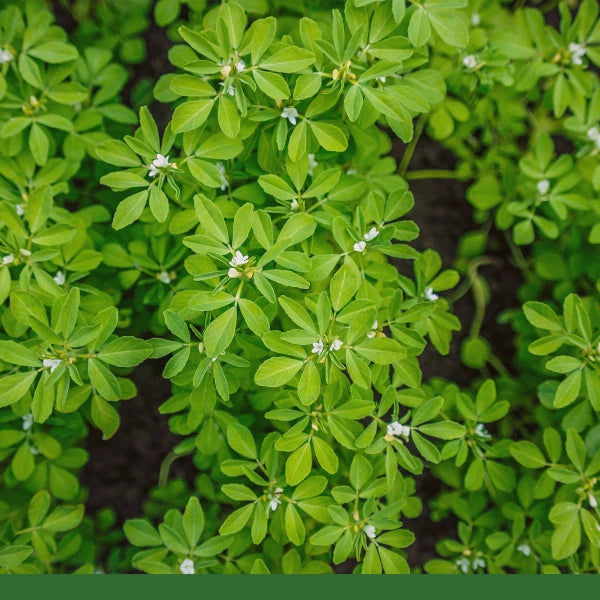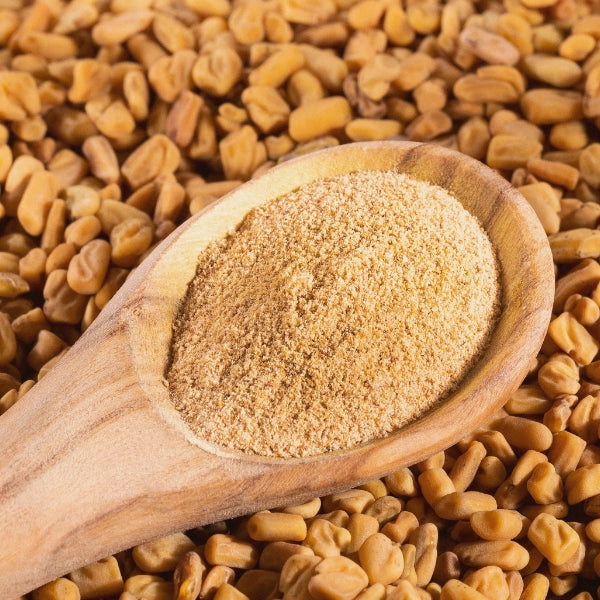Fenugreek Seed, Powder (Trigonella foenum-graecum) - Dried Herb, Organic
- Regular price
- $8.30
- Sale price
- $8.30
- Regular price
-
- Unit price
- per
Couldn't load pickup availability


Fenugreek is an annual plant in the family Fabaceae or Leguminosae, commonly known as the legume, pea or bean. This family includes trees, shrubs and perennial or annual herbaceous plants, which are easily recognized by their fruit (legume) and their compound (stipulate leaves consisting of three small obovate to oblong leaflets).
Fenugreek is native to the Mediterranean region, southern Europe and western Asia, including India and is now naturalized in Northern Africa, France and many other warm countries. Fenugreek plant history dates back to at least 4000 BC, used in Southern Asian, Indian, Pakistani and Bangladesh cuisine. In Indian cooking the seeds are often used for pickles, daals, spice mixes and vegetable dishes.
Its name is derived from its Latin name, Trigonella foenum graecum, meaning ‘Greek hay’, referencing to the Greek tradition of amending inferior hay for livestock with Fenugreek. Fenugreek seeds smell and taste like maple syrup because of a chemical in the plant called Sotolon. The Seeds have been used as medicine and to hide the taste of other medicine in Indian Ayurvedic medicines and Traditional Tibetan and Chinese medication for several centuries.
Fenugreek is one of the oldest medicinal plants, its seeds, leaves and even the whole plant are used to prepare powders and extracts for medicinal use. Fenugreek was used as incense in ancient Egypt and as a topical paste to heal skin conditions like burns, in Indian. Fenugreek traditionally was used for lactation and for digestion and in ancient Rome. Fenugreek was traditionally used for labour pain and delivery.
In Traditional Chinese Medicine Fenugreek Seeds were commonly used as a tonic for the lungs and large intestine; and to dispel dampness and warm the kidneys, helping to treat conditions like oedema. In many Asian and African civilizations Fenugreek was used traditionally to support the pancreas and blood sugar.
Fenugreek is rich in minerals such as copper, potassium, calcium, iron, selenium, zinc, manganes, and magnesium. It is also rich in many vitamins including thiamin, pyridoxine (vitamin B6), folic acid, riboflavin, niacin, vitamin A and vitamin C.
Properties:
The taste and energetics of Fenugreek are sweet, bitter, pungent warming, drying and slightly moistening. Fenugreek has an affinity towards the female and male reproductive organs, digestive system, liver, kidneys, respiratory system, pancreas, spleen, respiratory system and skin. Combine Fenugreek with Cordyceps, Pine Pollen or Ashwagandha to support male reproductive organs. To support the pancreas combine Fenugreek with Goat’s Rue, Licorice Root, Aloe or Siberian Ginseng.
How to use:
1 teaspoon of Fenugreek Seed to one cup of boiling water. Steep for 15 minutes, strain and drink up to three cups a day.
Use as a condiment for foods such as sauces, curries, vegetable dishes and soups.
To Stimulate Hair Growth, blend ½ cup soaked seeds with 1 tablespoon aloe vera gel, 1 tablespoon coconut oil and 6-7 drops of rosemary oil. Apply the mask to your scalp and leave on for 30-40 minutes before rinsing off.
Cautions & contraindications:
This information is for educational purposes only and is not intended to diagnose, treat or cure any disease or illness. Please consult your healthcare provider prior to the use of this product if you are pregnant, nursing, taking medications or have a medical condition. Individual results may vary.

